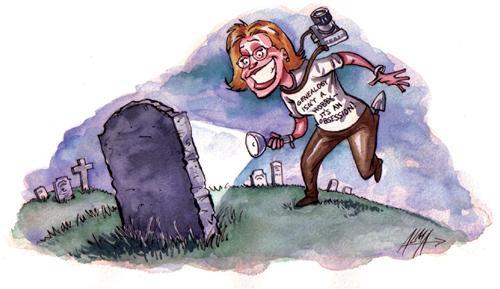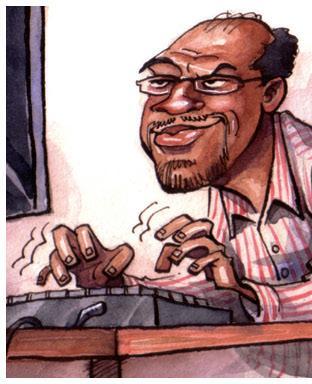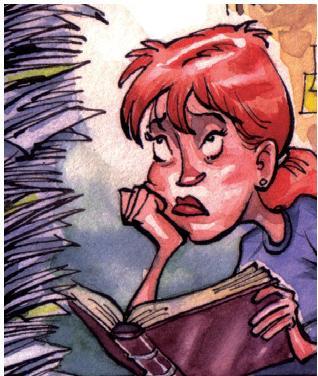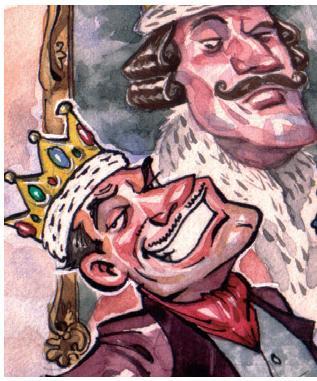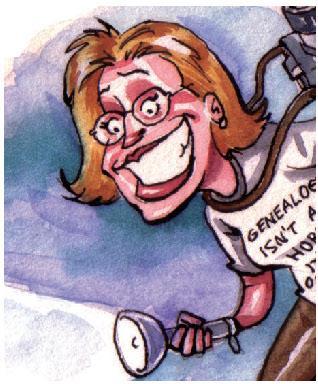Sign up for the Family Tree Newsletter Plus, you’ll receive our 10 Essential Genealogy Research Forms PDF as a special thank you!
Get Your Free Genealogy Forms
"*" indicates required fields
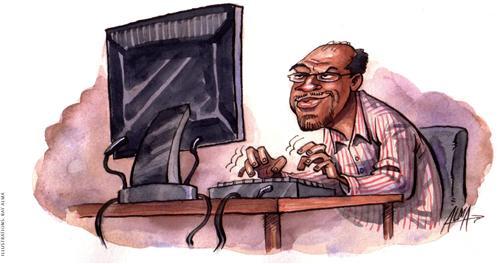
We’ve identified five common genealogical personalities, each with different strengths and weaknesses that can affect your research results. What kind of genealogist are you? Take our quiz to tap into your true nature.
1. You arrive at an old cemetery in a faraway town. where you believe many of your ancestors are buried. The property is fenced and all the entrances are padlocked. What do you do?
a. Pull out your Wi-Fi-equipped laptop to check Interment.net <www.interment.net> and Find a Grave <www.findagrave.com>. Perhaps someone has photographed the tombstones.
b. Go away and plan to come back another time.
c. Knock on several doors to find out who the caretaker is, and/or try to find a telephone listing for an office.
d. Since the cemetery used to be part of your wealthy great-great-grandfather’s estate, you’ve already picked up the key. You open the padlock and go in.
e. Vow not to leave until you get the information you came for — even if it means jumping over the fence.
2. You’ve been invited to attend the upcoming Clooney family reunion. What’s your strategy for the day?
a. Skip it — you can view the pictures on the family Web site.
b. Scarf down several of Aunt Ruth’s famous brownies and play horseshoes.
c. Visit with as many elder relatives as possible and record their stories. Only once a year is everyone in one place.
d. Is George invited? If not, you’re not going!
e. Bring your professionally printed 37-generation pedigree chart to show everyone how far you’ve researched the family tree.
3. Your cousin gives you a box of old, unidentified photographs. What do you do with the pictures?
a. Scan them before they become faded or damaged.
b. Casually flip through them, pick out the most interesting ones and try to find someone else in the family to take the rest.
c. Store them in acid-free albums in your coat closet.
d. Use MyHeritage’s <www.myheritage.com> online facial-recognition tool to identify strong celebrity resemblances in the photos. Sell the rest on eBay <ebay.com>.
e. Sort them, scan them and try to identify who’s in them by quizzing all your relatives and posting them to photo-reunion Web sites such as DeadFred <www.deadfred.com> and AncientFaces <www.ancientfaces.com>.
4. You suspect Uncle Lester knows some key family tree details, but he’s completely uninterested in genealogy: The first time you asked, he barked, “What do I care about those people? They’re dead.” What’s your next move?
a. Try to find someone else from another branch of the family by posting queries to online message boards.
b. Avoid him. You don’t want to get your head bitten off again.
c. Wait till the next family reunion to see if he’s softened.
d. Impress him with your 14-foot-long pedigree chart illustrating the family’s direct line to Charlemagne.
e. Try to break the ice by asking about the time he spent on a Navy fuel tanker during World War II.
5. Which best describes your genealogical filing system?
a. You store everything on your computer’s hard drive, which you back up to CDs.
b. What filing system?
c. a few stacks of papers here, some books over there, plus an assortment of shoeboxes stuffed with photographs
d. You organize research alphabetically by royal or noble line.
e. a well-organized filing cabinet, several color-coded and cross-referenced binders, and a genealogical software program with updated entries and source citations
6. How would you describe your participation at genealogy conferences and seminars?
a. Nonexistent. You’ve never attended one.
b. You bring along several pages of notes about your brick wall problems, hoping the speaker can give you advice — after all, she is the expert.
c. If there’s a conference happening locally, you’ll go to the Saturday sessions.
d. You hang out at the Daughters of the American Revolution booth and proudly wear your heraldry pins to the banquet.
e. You attend as many sessions as possible, and max out your credit card in the vendor area buying books, CDs software and “I Genealogy” bumper stickers for your car.
7. When you make a discovery about your ancestors, you
a. write about it on your blog.
b. thank heaven because finding your ancestors is so difficult.
c. say, “It’s about time!” Better late than never, right?
d. aren’t surprised. You come from a long line of overachievers.

8. What’s your idea of the perfect vacation?
a. staying home and locking yourself in the study to surf Ancestry.com <Ancestry.com > without interruption
b. a trip to the spa (you need a break!)
c. a long weekend to visit your ancestor’s hometown and make a research pit stop at the county courthouse
d. three weeks touring castles across Europe
e. a week in Salt Lake City: You’ll give the spouse and kids some money and send them to amuse themselves at the nearest mall while you camp out at the Family History Library.
9. After finding out a new subscription database has just launched, you
a. take advantage of the free trial period and bookmark the page in your browser.
b. sigh and exclaim, “Not another database to search!”
c. make a note to poke around in it when you have time.
d. try it out by searching for Thomas Jefferson, Prince Charles and Mary, Queen of Scots.
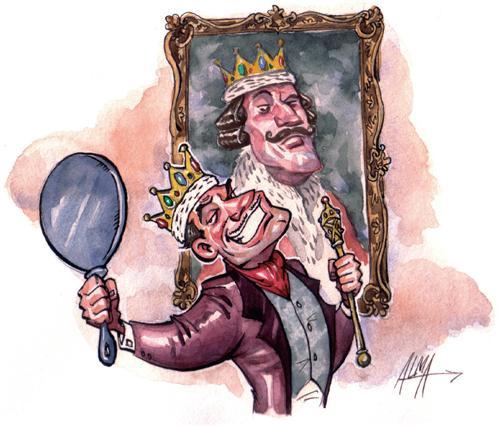
10. What’s your approach to brick wall problems?
a. Wait for FamilySearch <www.familysearch.org> to put the records online.
b. Lament about your ancestors’ propensity to hide from you.
c. Keep notes on your dead ends and file them away for another time, when you can approach the problems with fresh eyes.
d. You don’t have brick walls: Royal pedigrees have been thoroughly traced.
A. Cyber Genealogist
You’re a bit of a lone wolf when it comes to genealogy: Your computer is your constant (and only) companion. You shudder at the prospect of cranking microfilm, and your sinuses clog at the thought of visiting dusty courthouses. You gladly accept the family tree information others share with you, but you’re lax about returning the favor. You especially love to download GEDCOM files from online databases and graft them onto your family tree. Genealogical society meetings seem like a waste of time, since you can search the Internet 24/7 in your pajamas. You have nightmares about hackers destroying Ancestry.com. Your biggest frustration: databases that don’t link to scanned records or offer every-word searches.
? Strengths and talents: A self-professed technophile, you could be the poster child for 2lst-century genealogy. You’re a whiz at Boolean searching, and can navigate popular Web sites faster than your own neighborhood. If a record set exists online, you’ll find it. By subscribing to blogs, e-newsletters and mailing lists, you’ve got your pulse on the genealogical world.
? Pitfalls: No, that blur isn’t from staring at your computer monitor — you suffer from a serious case of tunnel vision. Although your knowledge of Internet resources is stellar, you’re overlooking the bigger picture of family history research (including records that aren’t on the Web). Your social skills may fall short, preventing you from seeking out relatives who could’ve supplied the same family information and records it took you months to find online. Your research may lack proper documentation. Being more of a taker than a giver, you risk alienating fellow researchers and missing out on help that could lead you to new clues.
? Research strategies: Step away from the computer! Try a radical new approach — such as spending an afternoon at the local courthouse or Family History Center. You need to reach out to relatives more, so why not call your Aunt Sally for a chat? Go to your local library and check out some books on source citations. Once you regroup, volunteer to transcribe data for a FamilySearch Labs project, or write a blog posting on how to search online databases.
B. Passive Pedigree Searcher
You consider yourself a genealogist, but in reality, you do little in-depth research: Despite your best intentions, watching the latest episode of “CSI” or “America’s Next Top Model” always seems to get in the way of spending an evening at the library, scouring 19th-century newspapers for Great-grandpa’s obituary. You’d like to conduct oral history interviews, but never schedule them. You’re perpetually running into “brick walls,” which pop up whenever the ancestor answers you’re looking for don’t manifest themselves easily. If you can’t find your forebear in an index, you assume the record must not exist. An ancestor’s name isn’t spelled the “right” way? It must not be him. You’ve never rented microfilm at a Family History Center or written to a records repository. Your research repertoire consists of censuses, vital records, published genealogies and a handful of favorite Web sites.
? Strengths and talents: You have a healthy curiosity about your roots: You don’t take yourself or the research process too seriously (in other words, you’re not a genealogy snob). You’ve acquired a basic working knowledge of available records and research techniques. You embrace serendipity. Your nongenealogist friends enjoy spending time with you because you know when to stop talking about the past.
? Pitfalls: You have the best of intentions, but lack the motivation to follow through on research leads. And though you talk the genealogy talk by professing the importance of saving and recording family history now, you don’t practice what you preach. Leaving things to fate or relying too much on luck produces false results and hinders your progress. You may be afraid or reluctant to try a new approach or go out on a limb to build your family tree.
? Research strategies: Ask yourself why you began doing genealogy in the first place. Dig in your heels to investigate claims or stories from relatives and find the necessary supporting documentation. Making a list of missing information and devising a research plan will help you chip away at those seemingly endless brick walls. Consider taking a class or attending a genealogy conference or workshop. Join your local genealogy society ASAP.
C. Weekend Warrior
Your motto: “So many ancestors, so little time!” Genealogy is important to you, but research usually takes a backseat to your other activities and commitments. You always seem to be starting a new project, but rarely finish. Typically, you find yourself cramming a week’s worth of research into a few hours on Saturday and Sunday. You feel like you’re drowning in an endless sea of papers, documents, old photos and other research materials, with no time or motivation to organize them.
? Strengths and talents: Because of your robust life outside of genealogy, you have a balanced outlook and approach to your research. You’re motivated to learn about your roots and willing to cram in research whenever you find the time. Multi-tasking is your modus operandi, and if you can ward off distractions and interruptions, you can usually focus on the task at hand.
? Pitfalls: Family history is but one activity on an endless list of priorities competing for your attention, so you never feel you have enough time to make much research progress. You live in a constant state of over commitment. Consequently, your hastily gathered genealogical paperwork is engulfing at least one room of your house-because of the chaos, you sometimes find yourself looking up details you’ve already found, and you forget to back up your computer files. You don’t have time to attend genealogical classes or conferences, especially those in faraway cities. If you’re not careful, genealogy tasks that should be fun or fascinating could become stressful and tedious.
? Research strategies: Invest in a calendar and read a book on time management. Pick one of your looming family history projects and break it into smaller tasks, then tackle them in order. You’ll benefit from setting aside a specific amount of time — perhaps 15 minutes per day, or an hour every Tuesday and Thursday — to spend on genealogy, such as looking up a census record online, drafting a letter to a relative, or scanning photos. Use a timer to stay on track and cross off each task you complete — it’ll enhance your sense of accomplishment. The research calendar and log at <www.familytreemagazine.com/freeforms> can help you note what you’ve done and what you haven’t, so you don’t duplicate efforts. From time to time, make genealogy priority No. 1 and sneak in some quality research time. Start a genealogy fund to save up for a new book or conference registration.
D. Blueblood Genealogist
You take excessive pride in your royal, famous and other illustrious ancestors. You claim connections to William the Conqueror and the monarchs of a dozen European nations, and scoff at those who delight in researching pedigrees composed of mere peasants. The thought of discovering a black sheep ancestor makes you break out in a cold sweat — in fact, you nearly had a nervous breakdown the time you thought you’d found a serf in your family tree. When no one else is home, you secretly dress up with a crown and scepter, and prance around humming “Don’t cha wish your ancestors were hot like mine?”
? Strengths and talents: You practice a no-nonsense approach to genealogy: You know your goal and stick to it. Your extensive and well-documented pedigree chart is the envy of fellow researchers. Because you’re so focused, you don’t have to worry about being pulled off track. You take pride in your heritage and in having a number of well-preserved family heirlooms passed down through generations. (Plus, the crown and scepter are pretty cool.)
? Pitfalls: Your arrogant, narrow-minded approach to family history leaves you in need of a reality check. Everyone — yes, including you! — has regular people in their pedigrees. By ignoring them, you risk introducing erroneous information into your research. After all, you do rely heavily on the secondary sources others have already compiled on famous people’s family trees. That also means you miss out on thrills such as tracking down a truly elusive ancestor (last we checked, no one has lost track of Richard I or Louis XIV yet). Your elitism shows in your small circle of genealogy friends, all of whom belong to the same exclusive lineage societies as you.
? Research strategies: If you appeared on “Dr. Phil,” he’d tell you, “Get over yourself!” You need to broaden your outlook and become more accepting of your fellow genealogists. Use your talents to help others complete their Daughters of the American Revolution and Mayflower Society applications. Volunteer to help the commoners (gasp!) via Random Acts of Genealogical Kindness <www.raogk.org> or USGenWeb <www.usgenweb.org>. Turn your crown and scepter into props for a talk at your local genealogical or historical society. Have your own DNA banked for future generations to reference.
E. Extreme Genealogist
No doubt about it: You’re addicted to family history. Your wardrobe consists primarily of “Genealogy is not a hobby — it’s an obsession” and “If it appears I’m not listening, it’s because I’m thinking about genealogy” T-shirts. You chomp at the bit to be the first to search a new online database, burst into tears whenever someone mentions the 1890 census, and find yourself stalking relatives for their used coffee cups just to get their DNA samples. Your overly enthusiastic approach often makes the librarian or vital-records clerk want to hide. You feel you know many of your ancestors better than your living relatives. All your vacations revolve around genealogical research, even if it means subjecting your spouse and/or children to marathon sessions at the library or courthouse. Your fixation on dead people may prompt family or friends to stage an intervention.
? Strengths and talents: You’re familiar with all the latest genealogical tools and search techniques, and can crack even the toughest missing-ancestor cases. Your take-charge attitude gets results. You bust through brick walls with savvy online searching and creative thinking. You’re always prepared for that impromptu stop at a cemetery-old clothing, jackets, hiking boots, insect repellent, a flashlight, a trowel and a camera are all stashed in the trunk of your car.
? Pitfalls: You’re so involved with genealogy, it interferes with your family and social life. Your friends rarely call you anymore; several have set up e-mail filters to automatically delete your rambling ancestor messages. You spend your entire entertainment budget-or worse, overdraw your checking account-to purchase the latest genealogy books, software and archival supplies. You tend to skip meals, showers, sleep and family activities when you’re making headway in an archive, library or in an online database.
? Research strategies: Stop before your genealogical addition requires rehab! There’s still hope for you — if you can put your life back in balance. Avoid burnout by doing something unrelated to genealogy from time to time. If you haven’t already, consider making genealogy a career. Create your own podcast or Web site to help others. If you prefer in-person interaction, volunteer at your local Family History Center or library. Mentor a budding young genealogist. Vow not to purchase any new family history products for six months and instead donate the money to your local genealogical or historical society.
Whether your “inner genealogist” leans toward one type or combines characteristics of several, don’t let your genealogical tendencies steer your research in the wrong direction. Use that knowledge to your advantage: Channel your strengths and apply our suggestions for overcoming your pitfalls, so you can reach your zenith of family history discovery — and fun.
From the March 2008 Family Tree Magazine.
ADVERTISEMENT

